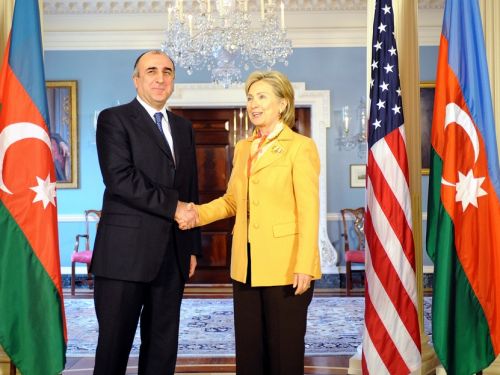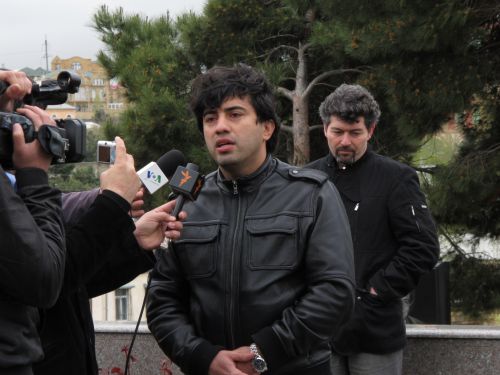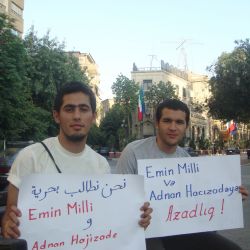“There will be someone to protect donkey civil rights. But who will protect human civil rights?” Thus ended the YouTube video where Adnan Hadjizade (27) and other youth activists make fun of the Government in Azerbaijan, portraying the president as a donkey, (published 28 June, 2009). Today, Hadjizade, together with his co-worker and human rights activists Emin Milli, are detained. One year after their arrest, the continuing imprisonment of the two bloggers has become common knowledge in human rights circles around the world.
Criticism from Council of Europe’s Commissioner for Human Rights
Following his visit to Azerbaijan in March this year, Thomas Hammarberg, Commissioner for Human Rights of the Council of Europe, published a new report. In this report, he expresses grave concern about continued threats, harassment and violence against journalists and human rights defenders in Azerbaijan. Most of these cases have not been investigated, and there seems to be no intention on the authorities’ side to do so. Hammarberg’s concern also refers to the number of media workers in recent years that have been sentenced under defamation provisions, including the case of Editor in Chief of “Gundelik Azerbaijan“ and “Realny Azerbaijan”, Eynulla Fatullayev.
In a 22 April 2010 judgment, the European Court of Human Rights called upon Azerbaijani authorities to grant Fatullayev’s immediate release. In the smae judgment, the Commissioner urged the authorities to immediately release all journalists and any other persons imprisoned as a consequence of their expressed views or opinions. The judgment reiterated that any imprisonment regarding defamation should follow the standards established by the European Court of Human Rights. So far, however, the Government of Azerbaijan continues to ignore the European Court of Human Rights’ guidelines and specific judgments. According to Ragsana Mammadova, manager of the Human Rights House in Baku, the Azerbaijani Government says that “the European Court can only suggest what we should do. We have no obligations to follow this.”
At the one-year-mark…
It’s been a year since the youth bloggers Emin Milli (30) and Adnan Hadjizade (27) were arrested. Following the court proceedings, in which they were charged with hooliganism, both local and international human rights organizations have recognized them as prisoners of conscience. The fact that they were found guilty of hooliganism is in itself condemnable.
Despite witness testimonies that Milli and Hadjizade were attacked by two other persons in the Baku restaurant where they were sitting with others, they were charged with hooliganism for themselves having attacked those other two. After the incident, Milli and Hadjizade went to the police to report the assault. Instead of seeing them as victims, the police detained them as suspects in the assault case. The two others, claiming to have been attacked, were released without being questioned. To this day, no charges against them have been made.
Milli and Hadjizade, on the other hand, were detained for 48 hours, with no medical assistance provided, and without being allowed to see their lawyers. After these 48 hours, a preliminary court ruling sentenced them to 2 months’ detention, with no evidence presented in favour of keeping them. On November 11, after 4 months’ of court trials, both were found guilty under § 221,2 hooliganism and § 127, inflicting internal minor bodily harm, by the Sabail district court of Azerbaijan. Hadjizade was sentenced to two years,’ and Milli to two and a half years’ imprisonment. The two are still in prison.
See the YouTube-video published by Adnan in August 2009 where he explains what happened to them here.
Supported by Hilary Clinton, adopted by Amnesty International
10 March this year, the Baku Appellate Court adopted the verdict of the Sabail District Court about the bloggers’ case. Amnesty International, who recognized and adopted the two bloggers as prisoners of concience already in November last year, wrote on their website.
“Adnan Hajizade and Emin Milli have fallen victim to the increasingly repressive measures taken by the Azerbaijani authorities to crackdown on critics of the government,” … “They were convicted on fabricated charges in a trial falling short of international standards for fairness solely because they were expressing their views.” … “Independent journalists and activists continue to face harassment and imprisonment in Azerbaijan despite the country’s international obligations to uphold the right to freedom of expression.”
 US Secretary of State Hillary Clinton visited Azerbaijan earlier this year, she also gave her support to the two bloggers’ case. Read more about this and how Azerbaijan continues to ignore its international obligations in a different HRHF-article here.
US Secretary of State Hillary Clinton visited Azerbaijan earlier this year, she also gave her support to the two bloggers’ case. Read more about this and how Azerbaijan continues to ignore its international obligations in a different HRHF-article here.
Freedom of speech still under pressure
Systematic and significant international attention to the many arrests and assaults aginst journalists has not moved the country’s authorities to ease their pressure on the media. Neither have repeated references to the assassination of Elmar Hüseynov in 2005, for which no-one has been charged and only limited investigations have been made. Instead, the list of attacks against journalists and violations of freedom of expression is only getting longer. While, the murder of Hüseynov remain the most condemnable, the ongoing trial against Editor-in-chief Eynulla Fatullayev, the beating of journalists in their homes and the arrest and beating of youth activists, add to the growing amount of evidence of the same trend.
22 July is declared the National Press Day in Azerbaijan. It has been celebrated since 1975. This year, the Institute for Reporters Freedom and Safety (IRFS) in Azerbaijan wanted to use the day to draw attention to the arrested journalists and freedom of speech-activists in the country. IRFS conducted a fundraiser marathon, “Support for Prisoners of Conscience” where the aim was to assist Azerbaijan’s three prisoners of conscience; Editor-in-chief Eynulla Fatullayev, who was arrested in 2007, and the two bloggers Emin Milli and Adnan Hajizade.
 In addition to visiting the grave of the murdered journalist Elmar Hüseynov and giving some speeches there, the IRFS also observed how the Government celebrated this day. -The IRFS calls the National Press Day a “black holiday,” says the organisation’s Chairman Emin Huseynov, right. With one journalist murdered in 2005, three more in prison today and strict limitations to freedom of expression, there is little to celebrate. And the fundraising did not go well either. We only got 500 AZN (approximately 500 EUR). The money was to be used to support the families of the arrested journalists. But this just shows that the solidarity with freedom of speech in Azerbaijan is pretty low.
In addition to visiting the grave of the murdered journalist Elmar Hüseynov and giving some speeches there, the IRFS also observed how the Government celebrated this day. -The IRFS calls the National Press Day a “black holiday,” says the organisation’s Chairman Emin Huseynov, right. With one journalist murdered in 2005, three more in prison today and strict limitations to freedom of expression, there is little to celebrate. And the fundraising did not go well either. We only got 500 AZN (approximately 500 EUR). The money was to be used to support the families of the arrested journalists. But this just shows that the solidarity with freedom of speech in Azerbaijan is pretty low.
Irony
While IRFS went with friends to Hüseynov’s grave and tried to raise funds for the families of the imprisoned journalists, Ilham Aliyev, the president of Azerbaijan, marked the National Press Day by attended the opening of a new Press Council building in the capital, Baku. Aflatun Amashov, Chairman of the the country’s Press Council, thanked the President for taking care of the development of the press in Azerbaijan. Amashov particularly highlighted that the new Press Council building meets modern standards and therefore is a gift to the country’s journalists. He also stated that censorship of the press in Azerbaijan was abolished in 1998, and that “Legislation has been improved in accordance with international standards”.
The President’s speech in response began by stating that: “Our press has great traditions and they continue to live”. Emin Huseynov is less enthusiastic: – The irony is complete, he says. -The Chairman’s gratitude to the President for his care for the media only shows that the Press Council is not independent, but instead controlled by the Government. For me, the National Press Day is not a special day. It is the same as any other day. They honour journalists, but throughout the rest of the year we get beaten and arrested. The only purpose of this day is to show the world that Azerbaijan has democracy and freedom of speech. But this is just an act, Huseynov concludes.
Nagorno-Karabakh still a sensitive issue
Imprisoned Editor-in-chief, Eynulla Fatullayev, was initially arrested and sentenced to two and a half years’ imprisonment on defamation charges in relation to an Internet posting on the 1992 Khojall massacre in Nagorno-Karabakh. Since the European Court of Human Rights has demanded of the Government of Azerbaijan to release him on these charges, the accusations against him have instead been changed, for him now to charged with possession of drugs.
The whole Nagorno-Karabakh issue is obviously still sensitive. Emin Huseynov of IRSF points out that President Aliyev touched upon the Nagorno-Karabakh in his National Press Day speech. -Some of the President’s expressions can be interpreted to have meant that references to the Nagorno-Karabakh will not be tolerated – on any level. He basically said that people who engage themselves with this issue will be imprisoned.
7 November this year, Azerbaijan will have parliamentary elections. –For that occasion, the authorities might want to create a democratic image. So it is possible that the bloggers will be released this autumn, speculates Huseynov. -It is less likely that Fatullayev will be released, though. The issue he has covered is just too sensitive. Not even his father believes that his son will be released from prison, Huseynov concludes.
Bloggers are threatened around the world
Worldwide, Azerbaijani bloggers are not alone in being pressurized by their authorities. In Egypt, two bloggers stood before a Cairo criminal court recently on charges of insult, defamation, blackmail and “abuse of the Internet service”. In the People´s Republic of China, the authorities have just turned down dozens of social networking tools referred to as “microblogging”. Twitter-users in Venezuela were arrested earlier this year, reports Reporters Without Boarders on their web page. Bloggers clearly cause anxiety, and Governments are increasingly wary of men and women who post news without being professional journalists, and raise sensitive issues which traditional media, more easily controlled, do not dare to cover.
Facts:
· There are about 3000 newspapers and magazines officially registered in Azerbaijan.
· 30 of these are released on a daily basis.
· 5 are ‘official’ newspapers, controlled by and loyal to the Government.
· 15 newspapers / magazines are currently closed / under supervision, The rest are independent / opposition newspapers.
· All 8 TV channels in Azerbaijan are controlled by the state.
· Radio Free Liberty, Voice of America and BBC radio in Azerbaijan have been limited to on-line broadcasting.





